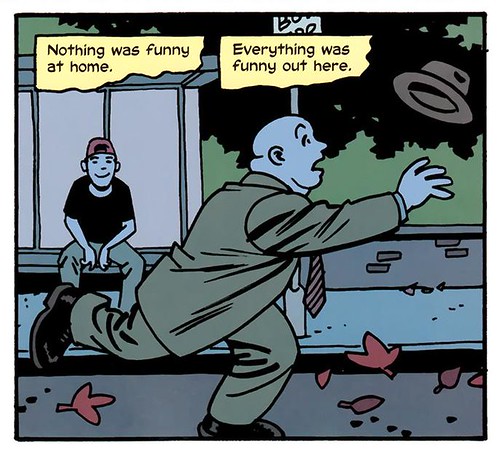
Hello hello! We're skipping a new Flashmob Fridays post this week due to the busy holiday season (Boxing Day really wiped us out), but Christopher Allen has a few thoughts on last week's featured title, Criminal: The Last of the Innocent. Chris, take it away:
In Ed Brubaker's best work, one finds the theme of man trying to escape the sins of his past. We see this in early work such as Lowlife and Deadenders, up through Sleeper, the Winter Soldier/Bucky saga in Captain America, and other Criminal stories. In The Last of the Innocent, we find Brubaker exploring this theme once again, with the ambition and reach we would expect from a serious artist.
We meet Riley Richards, a man who finds himself stuck in a life that crushes his soul, even as it affords him all the material comforts he could want. He is married to a rich bitch named Felicia, and working for her father. The father-in-law is cruel, while Felix (her nickname) has a bit more dimension, although it appears what was once love is now curdling into pity, and maybe even that is draining away, as Riley discovers she is sleeping with his old school rival, Teddy. Riley comes back to his hometown when his dad is hospitalized, and it is there that he's reminded of simpler times, and a possible escape from his current predicament. His first sweetheart, Lizzie, is still there, beautiful as ever and still pining for him, while his best pal, Freakout, has now been sober for a full year. Riley concocts a plan to rid himself of Felix, while establishing a solid alibi, a fall guy, and a way to keep Felix' money, in hopes of soon running away with Lizzie and starting life anew.

The plot itself, while almost bulletproof (there are a couple moments where Riley unnecessarily arouses or inflames suspicions), is just the engine for Brubaker to delve into one of his more complex characters. In fact, Riley is made more complex by the shades Brubaker gives the supporting cast. Felix's dad is a heel but his pursuit of Riley is justified not just by love and grief but by Riley's actual guilt. Felix isn't all bad, and there is some implication that her betrayal of Riley was set in motion by Riley's failure to become the man she hoped he would become. Riley doesn't appear to have been prevented from becoming a better man; the opportunity was there, but instead he gambled and caroused rather than pouring his energy into either work or saving his marriage. Freakout is that fun, bad influence that many Brubaker characters have to either abandon or destroy in order to start their new lives. Except Freakout is different; he actually knows Riley better than anyone, and he was well on his way towards his own personal redemption before Riley set him back on his self-destructive course.
 Aided by his best partner, Sean Phillips, Brubaker accessorizes this seedy melodrama with a series of one-page gag strips drawn in a style reminiscent of Archie Comics. And indeed, the characters themselves are stand-ins for Archie Andrews (Riley), Veronica/Ronnie (Felicia/Felix), Betty (Lizzie), Reggie (Teddy), and Jughead (Freakout), as well as amusing but not distracting nods to Moose, Mr. Weatherbee, and Valerie of Josie and the Pussycats. Brubaker has Phillips draw the gags in this similar, brightly colored style to emphasize how much simpler Riley's life was as a teenager, but he cleverly counters this conceit with the gags always revolving around either pain or seedy activity. Darker parodies of all-ages comics fare have been with us since Tijuana Bibles, so it's fortunate that Brubaker exercises restraint in their use here, and in fact, confining each flashback to a one page gag tends to sharpen his focus. However, while the Archie motif will certainly grab the attention of most fans, even those with only vague knowledge of Archie, what stood out for me was how sharp Brubaker's narration and dialogue was throughout the story. There is hardly a line or observation from Riley that doesn't reverberate with pain or self-loathing. We feel for Riley, up to a point, but his actions are unforgivable, particularly towards the innocent fool, Freakout, and so it makes Brubaker's seemingly happy ending all the better, because by now we know that Riley is the type of person who will find a way towards misery again.
Aided by his best partner, Sean Phillips, Brubaker accessorizes this seedy melodrama with a series of one-page gag strips drawn in a style reminiscent of Archie Comics. And indeed, the characters themselves are stand-ins for Archie Andrews (Riley), Veronica/Ronnie (Felicia/Felix), Betty (Lizzie), Reggie (Teddy), and Jughead (Freakout), as well as amusing but not distracting nods to Moose, Mr. Weatherbee, and Valerie of Josie and the Pussycats. Brubaker has Phillips draw the gags in this similar, brightly colored style to emphasize how much simpler Riley's life was as a teenager, but he cleverly counters this conceit with the gags always revolving around either pain or seedy activity. Darker parodies of all-ages comics fare have been with us since Tijuana Bibles, so it's fortunate that Brubaker exercises restraint in their use here, and in fact, confining each flashback to a one page gag tends to sharpen his focus. However, while the Archie motif will certainly grab the attention of most fans, even those with only vague knowledge of Archie, what stood out for me was how sharp Brubaker's narration and dialogue was throughout the story. There is hardly a line or observation from Riley that doesn't reverberate with pain or self-loathing. We feel for Riley, up to a point, but his actions are unforgivable, particularly towards the innocent fool, Freakout, and so it makes Brubaker's seemingly happy ending all the better, because by now we know that Riley is the type of person who will find a way towards misery again.Buy Criminal Vol. 6: The Last of the Innocent from Amazon.com.



No comments:
Post a Comment